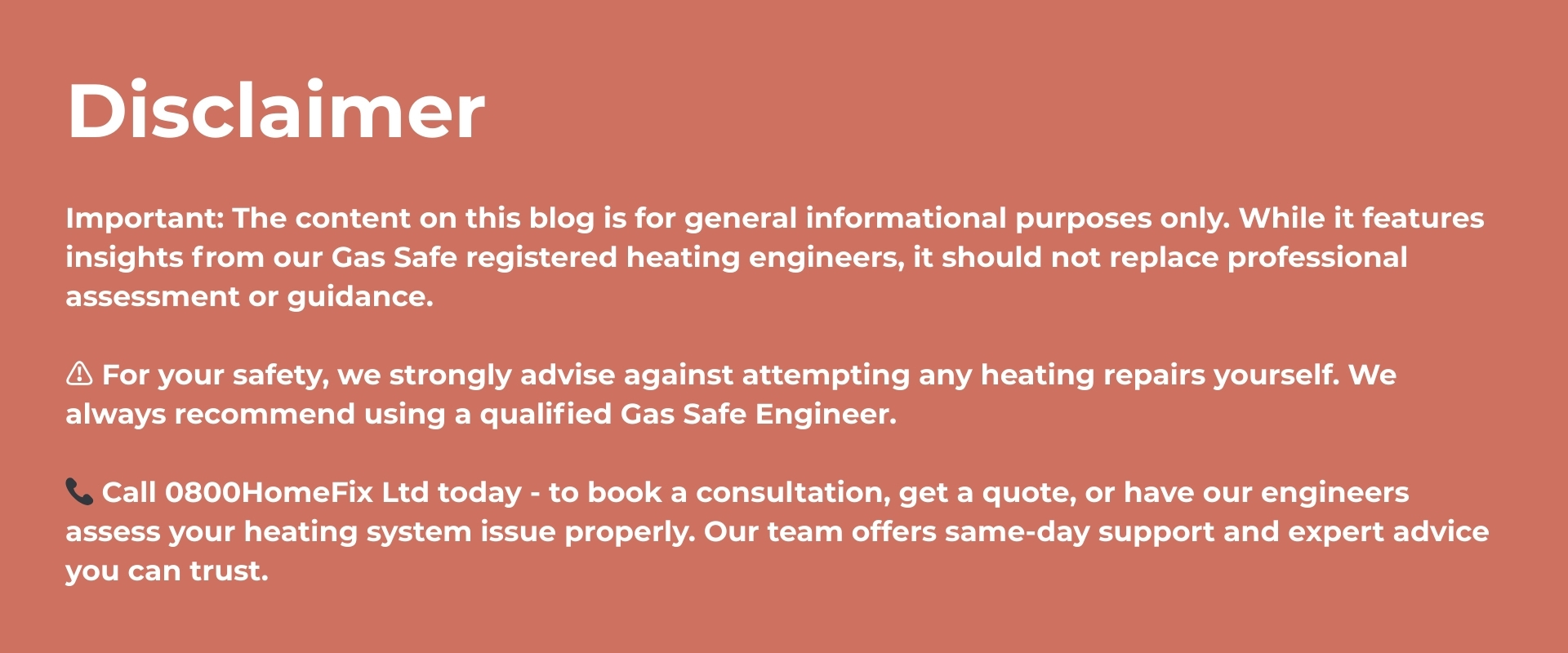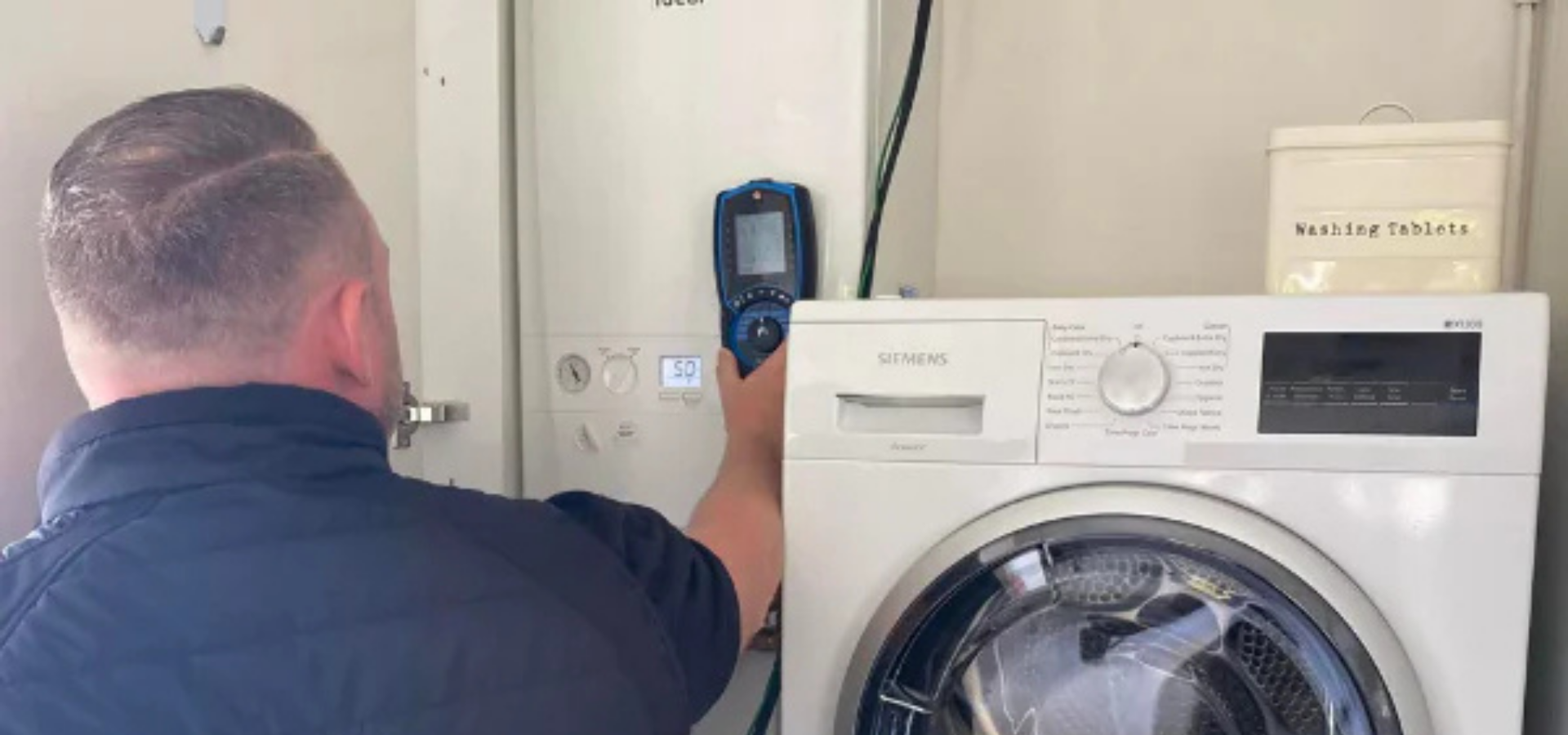

Introduction: Why Servicing Matters
Regular boiler servicing is one of the most important things a homeowner can do to keep their central heating system working efficiently, safely, and reliably. During a professional service, a Gas Safe registered engineer inspects the boiler’s key components, performs safety checks, and identifies common boiler problems before they lead to costly repairs or breakdowns.
0800 Homefix recommends an annual boiler service to ensure everything is running smoothly, maintain your boiler’s warranty, and reduce your energy bills in the long term. In this guide, we’ll break down the most common problems found during servicing, explain what causes them, and show how early detection can save you time and money.
Causes of Boiler Leaks
A leaking boiler is a clear sign something isn’t right, and it’s a common issue flagged during servicing. A boiler leak is one of the most common problems identified during a service. There are a few typical causes:
- Faulty pressure valve: If the boiler pressure is too high, it may release water to balance itself.
- Pump seal failure: A worn pump seal may leak water and affect circulation.
- Corrosion: Over time, rust can develop inside the system and weaken pipe joints or internal components.
- Poor installation: Loose joints or incorrectly installed pipework can lead to gradual leaks.
- Leaks in the system: A leaking system or system leak, such as from broken seals, valves, or corroded pipes, can cause water loss and reduce the boiler’s pressure.
Accessing certain leaks may require removing the boiler casing, which should only be done by a qualified engineer to ensure safety and compliance.
A Gas Safe engineer can pinpoint the source and either repair or recommend replacement parts to prevent further damage to your system.
Understanding Boiler Pressure
Low boiler pressure is one of the most frequently diagnosed issues. If your boiler doesn’t have enough pressure, it won’t push hot water through your radiators efficiently.
To identify low pressure, check the built in pressure gauge on your boiler. If the boiler’s pressure gauge shows a reading below the recommended level (typically below 1 to 1.5 bar), this indicates low boiler pressure and may point to leaks or other faults that require attention.
During a service, engineers will check:
- The boiler’s pressure gauge (typically should be 1 to 1.5 bar when cold)
- Leaks in the system that might be causing pressure drops
- Expansion vessel function
- Faulty pressure relief valves that may be letting water out unnecessarily
Regularly repressurising your boiler may temporarily solve low pressure, but persistent drops indicate a deeper issue that needs professional attention.
Issues with Condensate Pipes
Especially common during winter, a frozen or blocked condensate pipe – specifically a frozen condensate pipe – can shut down the entire boiler. This pipe carries acidic wastewater from the boiler to an external drain, and when blocked:
- The boiler may display fault codes
- Water may back up inside the unit
- The burner may shut off for safety
Condensing boilers are particularly prone to this issue, as their design relies on the proper drainage of condensate. Understanding the components of a condensing boiler and the typical faults, such as a frozen condensate pipe, is important for effective troubleshooting.
Boiler services include checking the condensate trap and pipe for proper flow, insulation, and drainage. 0800 Homefix engineers often install additional insulation or reroute the pipe to prevent future freezing, as frozen condensate pipes are a recurring winter problem.
If you experience a frozen condensate pipe, a simple troubleshooting tip is to carefully warm the pipe with a hot water bottle to help thaw the blockage safely.
No Heating or Hot Water
This is a frustrating issue and often the reason homeowners book a boiler service, as it affects the delivery of heating and hot water. Common causes identified during servicing include:
- Broken or faulty motorised valves
- Faulty thermostat
- Malfunctioning diverter valve (more common in combi boilers)
- Airlocks, failing pump, or other pump issues
- System pressure problems
By running a full diagnostics test, engineers can determine the exact fault and advise on whether a repair or part replacement is needed. If your boiler fails to provide heat or hot water, these issues – such as a failing pump or faulty motorised valves – may be responsible.
Common Boiler Fault Codes
Modern boilers are equipped with digital displays that show fault codes. During a service, engineers check for active or historical codes that may indicate ongoing problems.
For guidance on interpreting these fault codes, always consult your boiler manual or boiler manufacturer’s instruction manual, as they provide specific troubleshooting steps and safety instructions.
Some fault codes may indicate a failed component that requires professional inspection and repair.
Worcester Bosch Codes
- EA – No flame detected
- E9 – Overheating
- A1 – Pump failure or blockage
- C6 – Fan speed error
- EA 227 – Ignition fault
Vaillant Codes
- F22 – Low pressure
- F28 – Ignition failure
- F29 – Flame loss
- F75 – Pump or sensor issue
Ideal Codes
- L2 – Flame loss
- F1 – Low pressure
- F7 – Gas valve relay fault
Baxi Codes
- E119 – Low pressure
- E133 – Ignition lockout
- E160 – Fan fault
Potterton Codes
- E160 – Fan problem
- E133 – Ignition fault
- E119 – Pressure issue
Reading and clearing these fault codes allows engineers to address problems early and prevent a full boiler shutdown.
Noisy Boilers and Heating Systems
Unusual boiler noise coming from your boiler or radiators may be due to air in the system, limescale build-up, or a failing pump. Common sounds include:
- Banging or knocking – May indicate kettling, trapped air, or a failing pump
- Gurgling – Often caused by air, water flow issues, or a failing pump
- Whistling – Could signal pressure problems
Bleeding radiators and performing a chemical flush are some solutions engineers use during servicing to restore silence and efficiency.
Pilot Light and Ignition Problems
Older boilers often use pilot lights, which are small gas burners that stay lit to ignite the main burner. In contrast, modern systems typically use electronic ignition and do not have pilot lights. If the pilot light persists in going out, possible causes include draught blowing out the flame, debris or buildup on the gas nozzle, or issues with the small gas burner itself. When troubleshooting, always check the gas supply and ensure other gas appliances or gas appliances in your home are functioning properly.
If it’s repeatedly going out, the service might uncover:
- Faulty thermocouple
- Gas valve problems
- Blocked pilot jet
For electronic ignition, the PCB (Printed Circuit Board) or electrode may be the culprit. A thorough service will test ignition components and clean or replace faulty parts as needed.
Blocked or Dirty Heat Exchanger
The heat exchanger transfers heat from the burner to the water. Over time, it can become blocked with limescale or sludge, reducing efficiency or even causing the boiler to overheat.
Symptoms include:
- Frequent lockouts
- Noisy operation
- Poor heating performance
Engineers will often chemically clean the heat exchanger during a service or recommend a replacement in severe cases. In particularly severe cases, the system may need to be system professionally flushed by a qualified engineer.
Flue and Ventilation Checks
A blocked or damaged flue is not only an efficiency issue – it’s a major safety risk. Flue testing during servicing checks for:
- Carbon monoxide leaks
- Proper expulsion of gases
- Ventilation blockages or restrictions
0800 Homefix engineers use flue gas analysers to test emissions and ensure your home remains safe from dangerous gases.
System Sludge and Debris
Engineers may take a sample of the system water to check for signs of corrosion or sludge. A dirty central heating system:
- Heats unevenly
- Causes cold radiators
- Damages internal components
Recommendations may include a power flush, magnetic filter installation, or inhibitor top-up to keep water quality clean.
FAQs
- How often should my boiler be serviced?
At least once a year by a registered boiler engineer or heating engineer who is Gas Safe registered. It’s also required by most manufacturers to keep your warranty valid. - Is it safe to use the boiler if a fault code is showing?
Not always. Some codes indicate minor issues, while others (like overheating or gas faults) could be dangerous. If the boiler breaks, always consult an engineer. - Can servicing really reduce energy bills?
Yes, because a well-maintained boiler runs more efficiently and avoids unnecessary gas usage. Regular servicing and boiler cover can help prevent breakdowns and avoid costly repairs. - What if my boiler fails the service?
The engineer will explain the issues and provide a quote for repair or replacement if needed. If you have a boiler failing or a broken boiler that cannot be repaired, you may need to consider getting a new boiler or having a new boiler installed. - Can I perform any checks myself?
Homeowners can check pressure, bleed radiators, and look for leaks, but annual servicing must be done by professionals. If you suspect an issue with the gas supply, contact your gas supplier.

